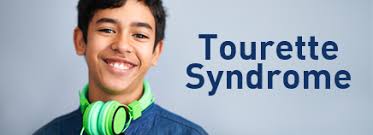On this week& #39;s #LearnwithUIMSA, We& #39;d be talking about a syndrome.
Can you guess? Boys are 3-4 times more likely to develop it. For some people, it can cause problems with depression, anxiety, sleeping disorders, and dyslexia.
Yes, we& #39;re talking about Tourette Syndrome.
Can you guess? Boys are 3-4 times more likely to develop it. For some people, it can cause problems with depression, anxiety, sleeping disorders, and dyslexia.
Yes, we& #39;re talking about Tourette Syndrome.
Tourette /too-RET/ Syndrome is a neurological condition that causes people to make repetitive and sudden movements or sounds, called TICS, that they cannot control.
For example, someone with Tourette& #39;s might blink or clear their throat over and over again.
For example, someone with Tourette& #39;s might blink or clear their throat over and over again.
It often shows up between ages 2 and 15 and boys are 3-4 times more likely to develop it than girls. Symptoms often get better as children grow up. For some people, they go away completely. People who have family members with Tourette& #39;s are more likely to get it.
#LearnwithUIMSA
#LearnwithUIMSA
Although people in the same family may have different symptoms. Main symptoms are tics. Some are so mild they are not even noticeable. Others happen and are obvious. Stress, excitement or being sick can make it worse. The types are Motor tics and Verbal tics.
#LearnwithUIMSA
#LearnwithUIMSA
Motor tics involve movement. It includes arm or head jerking, blinking, making a face, mouth twitching, shoulder shrugging. Verbal tics include barking/yelping, clearing your throat, coughing, grunting, repeating what someone says, shouting, and swearing https://youtu.be/_ZfpJbjgCcI ">https://youtu.be/_ZfpJbjgC...
Tics can be simple or complex. A simple tic affects one or just a few parts of the body, like blinking the eyes or making a face. A complex one involves moving parts of the body or saying words. Jumping and swearing are examples.
#LearnwithUIMSA
#LearnwithUIMSA
Before a motor/vocal tic, you may get a sensation that can feel like an itch, a tingle or tension. Expression of the tic brings relief. You might be able to hold your tics back for a little while, but you probably can& #39;t stop them from happening.
#LearnwithUIMSA
#LearnwithUIMSA
About half of people with Tourette& #39;s also have symptoms of ADHD. You may have trouble paying attention, sitting still and finishing tasks. It can co-occur with Anxiety, Learning disabilities, Obsessive-compulsive disorder(thoughts and behaviour you can& #39;t control).
#LearnwithUIMSA
#LearnwithUIMSA
Treatment can control tics but some people don& #39;t need any unless their symptoms really bother them. Medication, Talk therapy and Behaviour therapy can help. The hardest part of living with Tourette& #39;s is dealing with the embarrassment/frustration of having tics you cannot control.
People with Tourette& #39;s need support from family and friends. They also need to stay active, by playing sports or relax, by reading a book or meditate. It is important to educate yourself on the condition which would help you to be emotionally sensitive with people with Tourette& #39;s
To learn more about Tourette& #39; syndrome, https://youtu.be/uw06dMWfIuc
You">https://youtu.be/uw06dMWfI... can also read this thread by Jamie Grace, a musical artist with Tourette& #39;s Syndrome.
https://twitter.com/jamiegraceh/status/1261463981371166722?s=19
https://twitter.com/jamiegrac... href="https://twtext.com//hashtag/LearnwithUIMSA"> #LearnwithUIMSA
You">https://youtu.be/uw06dMWfI... can also read this thread by Jamie Grace, a musical artist with Tourette& #39;s Syndrome.
https://twitter.com/jamiegraceh/status/1261463981371166722?s=19

 Read on Twitter
Read on Twitter




